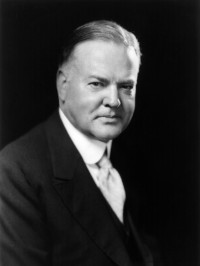Thirty-first president of the United States (1929-1933)

Herbert Clark Hoover (1874-1964) was an American politician and humanitarian who served as the 31st president of the United States from 1929 to 1933. He was a member of the Republican Party, and held office during the onset of the Great Depression. A wealthy mining engineer before his presidency, Hoover led the wartime Commission for Relief in Belgium and was the director of the U.S. Food Administration, followed by post-war relief of Europe. In the 1920s, he served as the U.S. Secretary of Commerce.
Born
Died
20 Oct 1964, in New York City
Articles
The battle to make America wet again, by Nicholas A. Snow, LearnLiberty.org, 8 Mar 2017
Recounts how the 18th Amendment (ratified January 1919) and National Prohibition Act were repealed (in December 1933), particularly through the efforts of the Women's Organization for National Prohibition Reform (WONPR)
Recounts how the 18th Amendment (ratified January 1919) and National Prohibition Act were repealed (in December 1933), particularly through the efforts of the Women's Organization for National Prohibition Reform (WONPR)
Herbert Hoover famously called alcohol Prohibition the "Noble Experiment," and it certainly began with noble intentions. Prohibitionists expected the absence of legal alcohol would solve a plethora of social ills created by drinking ... How did the wets overcome these vast hurdles to repeal? There isn’t one answer, but the arrival of the Great Depression (along with Hoover and Roosevelt’s costly recovery programs) helped create political demand for more government revenue, which taxes on legal alcohol sales could help fill.
Hoover's Second Wrecking of American Agriculture, by James Bovard, Freedom Daily, Dec 2005
Follow-up to "How the Feds Took Over Farming", describes the policies of Hoover's Federal Farm Board, the Smoot-Hawley Act, the Federal Reserve and taxes as contributors to the Great Depression and particularly their effect on farmers
Follow-up to "How the Feds Took Over Farming", describes the policies of Hoover's Federal Farm Board, the Smoot-Hawley Act, the Federal Reserve and taxes as contributors to the Great Depression and particularly their effect on farmers
Herbert Hoover, nominated by the Republican Party to replace Coolidge in the 1928 presidential race, strongly supported federal farm intervention. In his speech accepting the presidential nomination in 1928, Hoover promised to create a farm board to "establish for our farmers an income equal to those of other occupations." ... Lionel Robbins, a British economist, observed in 1934,
The grandiose buying organizations by which Hoover tried to maintain agricultural prices had the effect of demoralizing markets altogether, by the accumulation of stocks and the creation of uncertainty.
Reviews
Capitalism Saves Us All, by Bernard Chapin, LewRockwell.com, 14 Jun 2004
Review of Thomas J. DiLorenzo's How Capitalism Saved America: The Untold History of Our Country, from the Pilgrims to the Present (2004)
Review of Thomas J. DiLorenzo's How Capitalism Saved America: The Untold History of Our Country, from the Pilgrims to the Present (2004)
Herbert Hoover, in contrast with his reputation, was in no way a devotee of laissez-faire government ... There were many examples of governmental futility during the administration, such as the Railway Labor Act where he empowered unions over employers ... Hoover believed anti-trade tariffs actually benefited American workers and nowhere was this more the case than with his visible support of the Smoot-Hawley Tariff. He seemed to create "more government" wherever he could as he formed the Bureau of Aeronautics and created a policy distributing licenses to radio broadcasters.
The introductory paragraph uses material from the Wikipedia article "Herbert Hoover" as of 4 Sep 2024, which is released under the Creative Commons Attribution-Share-Alike License 3.0.
